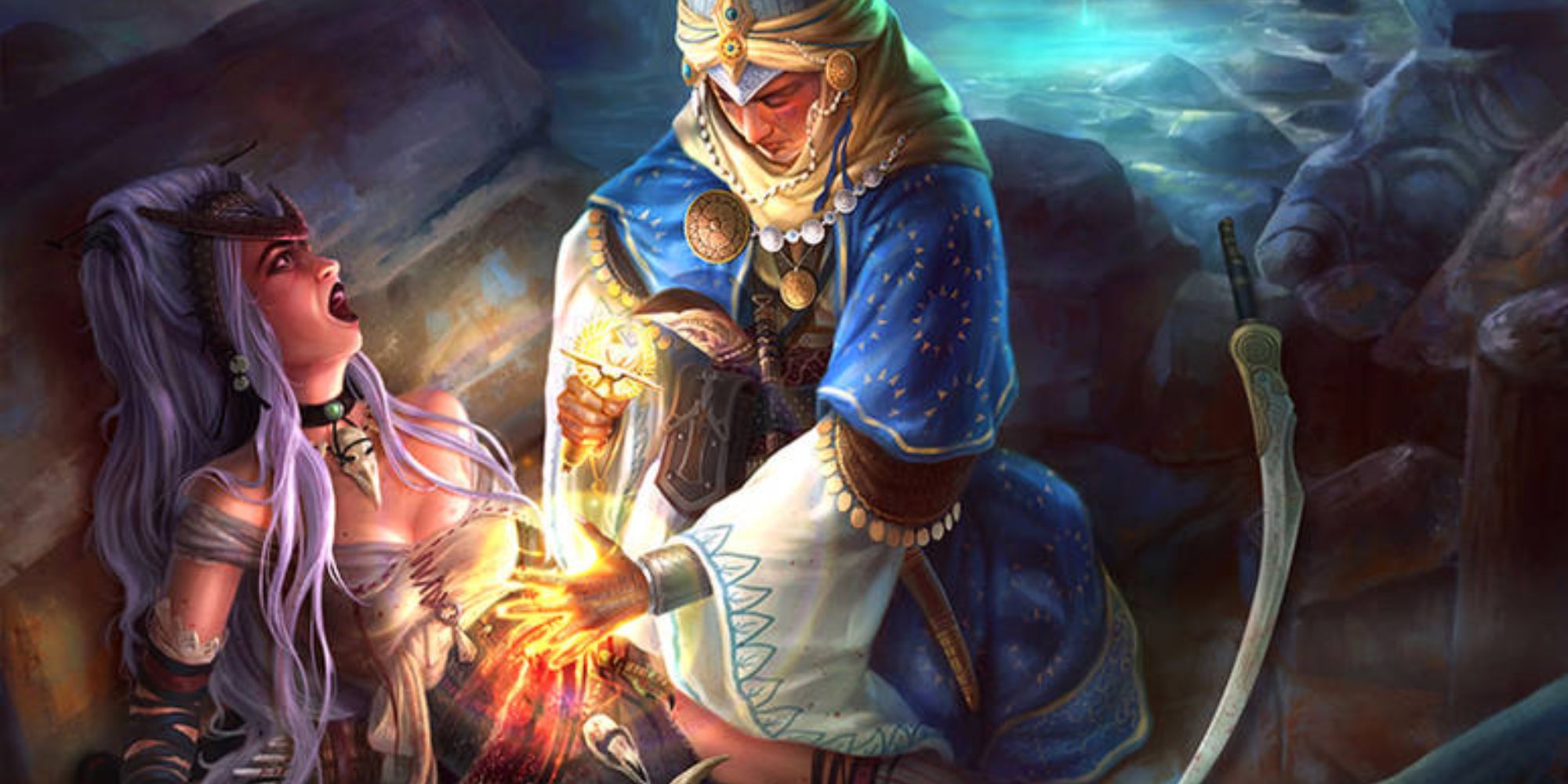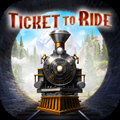
Quick Links
- Warpriest
- Cloistered Cleric
Clerics have access to powerful magic in Pathfinder, provided that they faithfully serve the deity that blesses them. You can choose to play a Cleric either as a Warpriest, fighting on the front line while bolstering yourself and your allies with magic, or you can play a Cloistered Cleric, focusing entirely on spellcasting.
Related: Pathfinder 2e: How To Build A Fighter
There are a lot of different ways to play a Cleric in Pathfinder, due to the number of gods and alignments that will determine your capabilities. Try one of the builds below to get the most out of your divine caster!
All the options in this guide are available in the Pathfinder Core Rulebook. You may find options in expansion sourcebooks that you like more, so check them out if you want to try different ideas.
Warpriest
Art via Paizo Inc.A Warpriest is a capable melee combatant as well as a spellcaster. They might not have quite the raw prowess of a Barbarian or Fighter, but they can certainly handle themselves and their spells let them turn the tide of battle.
Ability Scores
A Warpriest should prioritize Wisdom, Constitution, and Strength, in that order. Wisdom lets them cast spells more effectively, while Constitution and Strength are both required for up-close fighting.
Deity
Warpriests should generally pick Deities who favor melee weapons, though it's important to choose one that matches your Alignment and whose Edicts and Anathemae you'll be able to follow. We recommend one of the following:
Deity
Alignment
Weapon
Skill
Divine Font
Spells
Asmodeus
Lawful Evil
Mace
Deception
Harm
Charm, Suggestion, Mislead
Cayden Cailean
Chaotic Good
Rapier
Athletics
Heal
Fleet Step, Touch of Idiocy, Hallucination
Gorum
Chaotic Neutral
Greatsword
Athletics
Harm or Heal
True Strike, Enlarge, Weapon Storm
Gozreh
Neutral
Trident
Survival
Heal
Gust of Wind, Lightning Bolt, Control Water
Iomedae
Lawful Good
Longsword
Intimidation
Heal
True Strike, Enlarge, Fire Shield
Lamashtu
Chaotic Evil
Falchion
Survival
Harm or Heal
Magic Fang, Animal Form, Nightmare
Norgorber
Neutral Evil
Shortsword
Stealth
Harm
Illusory Disguise, Invisibility, Phantasmal Killer
Rovagug
Chaotic Evil
Greataxe
Athletics
Harm
Burning Hands, Enlarge, Disintegrate
Sarenrae
Neutral Good
Scimitar
Medicine
Heal
Burning Hands, Fireball, Wall of Fire
Torag
Lawful Good
Warhammer
Crafting
Heal
Mindlink, Earthbind, Creation
Zon-Kuthon
Lawful Evil
Spiked Chain
Intimidation
Harm
Phantom Pain, Wall of Thorns, Shadow Walk
All of these Deities grant access to powerful favored weapons, useful combat spells, or both.
Ancestry
Dwarves make exceptional Warpriests due to their boosts in Constitution and Wisdom.
Halflings can also do quite well if their chosen Deity favors Finesse weapons; Cayden Cailean is a great choice for a Halfling Warpriest for this reason. Be sure to favor Dexterity over Strength if you choose this Ancestry!
Humans are good at just about anything, and playing a Half-Orc could give you extra survivability in combat.
Background
It's a good idea to tailor your Background to your Deity, but when in doubt Bounty Hunter, Field Medic, and Nomad are all great fits for a Warpriest.
Feats
These feats will make your Warpriest an exceptional combatant, especially when you start bringing your spells to bear!
Level
Cleric Feat (Choose One)
Reason
1
- Deadly Simplicity
- Increases the maximum damage dealt by of your Deity's favored weapon.
2
- Emblazon Armament
- Lets you enchant a weapon or shield to make it more effective.
4
- Channel Smite
- Lets you spend Heal or Harm spells to empower melee Strikes instead of their normal effects.
6
- Divine Weapon
- Lets you enhance your weapon's damage after casting a divine spell.
8
- Emblazon Energy
- Allows more powerful enchantments through Emblazon Armament.
10
- Replenishment Of War
- Lets you heal yourself after dealing damage with your Deity's favored weapon.
12
- Shared Replenishment
- Upgrades Replenishment Of War, letting you choose to heal a nearby ally instead of yourself.
14
- Swift Banishment
- Lets you cast Banishment on a creature from another plane when you critically hit them, as long as you have the spell prepared.
16
- Eternal Bane (if evil)
- Eternal Blessing (if good)
- Resurrectionist (if neutral)
- Eternal Bane and Eternal Blessing grant a permanent aura.
- Resurrectionist quickly heals any creature that you restore from dead or dying status.
18
- Improved Swift Banishment
- Lets you use Swift Banishment even if you don't have the correct spell prepared.
20
- Avatar's Audience
- Lets you travel to and from your Deity's plane with ease.
Equipment
Start by purchasing your religious symbol as well as your Deity's favored weapon. Once that's done, most of your remaining budget should go to a good set of armor. Chain Mail or a Breastplate offer the best protection that you can afford, unless you're playing a Dexterity-based Finesse build; in that case, go with Leather Armor.
If your weapon can be wielded in one hand, and you have some cash left over, a shield will also prove useful.
Related: Everything You Need To Play Pathfinder
Cloistered Cleric
Harrow Master via Will O'BrienAs a Cloistered Cleric, your focus will be almost entirely on spellcasting. This includes using your Divine Font to cast Harm and/or Healspells frequently. The exact details, of course, will depend on your chosen Deity.
Ability Scores
Wisdom is your first priority by miles as a Cloistered Cleric, as it's used for casting spells. Dexterity is a good second choice, since it will help increase your AC and keep you alive. After that, focus on Intelligence and Charisma to bolster your Skills.
Deity
Unlike the Warpriest, Cloistered Clerics can excel with any Deity. Choose the one that best fits your Alignment and play style.
One of the most important choices for a Cloistered Cleric is whether they want a Deity that will allow them to Harm, Heal, or (with the right Feat) both. For ease of reference, here's a list of every Deity sorted by their Divine Font:
Divine Font
Deities (Alignment)
Harm
- Asmodeus (LE)
- Norgorber (NE)
- Rovagug (CE)
- Urgathoa (NE)
- Zon-Kuthon (LE)
Heal
- Cayden Cailean (CG)
- Desna (CG)
- Erastil (LG)
- Gozreh (N)
- Iomedae (LG)
- Nethys (N)
- Pharasma (N)
- Sarenrae (NG)
- Sheryn (NG)
- Torag (LG)
Both
- Abadar (LN)
- Calistria (CN)
- Gorum (CN)
- Irori (LN)
- Lamashtu (CE)
Ancestry
Halflings make exceptional Cloistered Clerics, since they have boosts to both Wisdom and Dexterity. That said, Cloistered Clerics have forgiving enough Ability Score needs that nearly any Ancestry can do well in this role.
The one exception are Goblins, who can struggle as Clerics due to their Wisdom penalty.
Background
Acolyte and Scholar are both tailor-made for Cloistered Clerics, but there are lots of fun options if you want to try something outside the box. A priestly Detective, Fortune Teller, or even Gambler would have useful Feats and offers a fun opportunity for a unique backstory.
Feats
There are so many different combinations of Feats available as a Cloistered Cleric that your picks will be based on your Deity. At each level, look for Cleric Feats whose prerequisites match your Alignment, Divine Font, or both. You could end up with an unmatched healer, an imposing necromancer, or even combine Harm and Heal powers to hold life in your hands!
Equipment
You're going to have to go unarmored in most cases, unless you can get a defensive Proficiency from somewhere other than you class. On the bright side, that means you'll have more money to spend on supplies! A religious symbol and your Deity's favored weapon are the bare minimum; after that, you have plenty of freedom with your gold.
Next: Pathfinder 2e: How To Build A Rogue













